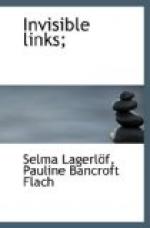Those speeches were never printed. They were hunting-cries, ringing trumpet-notes, rousing, animating, terrifying, urgent; not to capture, not to give again. They were lightning flashes and rolling thunder. They shook hearts with terrible alarms. But they were transient, never could they be caught. The cataract can be measured to its last drop, the dizzy play of foam can be painted, but not the elusive, delirious, swift, growing, mighty stream of those speeches.
That day in the wood he asked the gathering if they knew how they should serve God?—as Uria served his king.
Then he, the man in the pulpit, became Uria. He rode through the desert with the letter of his king. He was alone. The solitude terrified him. His thoughts were gloomy. But he smiled when he thought of his wife. The desert became a flowering meadow when he remembered his wife. Springs gushed up from the ground at the thought of her.
His camel fell. His soul was filled with forebodings of evil. Misfortune, he thought, is a vulture, which loves the desert. He did not turn, but went onward with the king’s letter. He trod upon thorns. He walked among serpents and scorpions. He thirsted and hungered. He saw caravans drag their dark length through the sands. He did not join them. He dared not seek strangers. He, who bears a royal letter, must go alone. He saw at eventide the white tents of shepherds. He was tempted, as if by his wife’s smiling dwelling. He thought he saw white veils waving to him. He turned away from the tents out into solitude. Woe to him if they had stolen the letter of his king!
He hesitates when he sees searching brigands pursuing him. He thinks of the king’s letter. He reads it in order to then destroy it. He reads it, and finds new courage. Stand up, warrior of Judah! He does not destroy the letter. He does not give himself up to the robbers. He fights and conquers. And so onward, onward! He bears his sentence of death through a thousand dangers. ...
It is so God’s will shall be obeyed through tortures unto death. ...
While Wik spoke, his divorced wife stood and listened to him. She had gone out to the wood that morning, beaming and contented on her husband’s arm, most matron-like, respectable in every fold. Her daughter and the apprentice carried the luncheon basket. The maid followed with the youngest child. There had been nothing but content, happiness, calm.
There they had lain in a thicket. They had eaten and drunk, played and laughed. Never a thought of the past! Conscience was as silent as a satisfied child. In the beginning, when her first husband had slunk half drunk by her window, she had felt a prick in her soul.
Then she had heard that he had become the idol of the Salvation Army. She was, therefore, quite calm. Now she had come to hear him. And she understood him. He was not speaking of Uria; he was telling about himself. He was writhing at the thought of his own sacrifice. He tore bits from his own heart and threw them out among the people. She knew that rider in the desert, that conqueror of brigands. And that unappeased agony stared at her like an open grave. ...




